- Home
- -Blog
Expert Link Building Specialist: Key Skills & Strategies

- 23 July 2024
- Shabir Ahmad
Expert Link Building Specialist: Key Skills & Strategies
Link building is the process of acquiring hyperlinks from other websites to your own. These hyperlinks, commonly known as backlinks, play a crucial role in SEO. They signal to search engines like Google that your website is a credible and valuable resource. The more high-quality backlinks a site has, the better its chances of ranking higher in search engine results.
Studies show that backlinks are a significant factor in Google's ranking algorithm. According to a study by Backlinko, the number one result in Google's organic search results has an average of 3.8 times more backlinks than positions two through ten.
Another research by Moz indicates that 99.2% of all top 50 results had at least one backlink. This demonstrates the importance of backlinks in achieving and maintaining high search engine rankings.
5 Examples of Link Building Job Descriptions
FUZEN Link Building Job Description
- Link-Building Strategy: Develop and execute a comprehensive off-page SEO strategy with a strong emphasis on quality link acquisition.
- High-Quality Backlink Acquisition: Identify and secure backlinks from authoritative, industry-relevant websites through methods such as outreach, guest posting, partnerships, and content-based link-building.
- Relationship Building: Build and nurture relationships with influencers, bloggers, and website owners to establish long-term linking opportunities.
- Content Collaboration: Collaborate with our content team to create linkable assets (e.g., articles, infographics) and support outreach campaigns that attract natural backlinks.
- Competitive Analysis: Analyze competitors' backlink profiles to identify link-building opportunities and potential gaps.
- Performance Tracking: Use SEO tools (e.g., Ahrefs, SEMrush) to monitor backlink performance, track improvements in rankings, and adjust strategies as needed.
- Performance-Linked Incentives: Meet specific link-building targets with compensation tied to measurable results, including domain authority growth and organic search ranking improvements.
Seahawkmedia Link Building Job Description
- Develop and execute link building strategies to increase website traffic and improve search engine rankings. Identify relevant websites, blogs, and online platforms for outreach and collaboration to acquire high-quality backlinks.
- Conduct thorough research to understand industry trends, competitor strategies, and link building opportunities.
- Build and maintain relationships with website owners, bloggers, and influencers to secure guest post opportunities and backlink placements.
- Utilize data scraping and data collection techniques to gather contact information and other relevant data for outreach.
- Manage and run scripts for automating various aspects of link building and data collection.
- Leverage Google Sheets for organizing and analyzing data efficiently.
- Execute email marketing campaigns and use email marketing tools to enhance outreach efforts
Public media solution Link Building Job Description
- Work with the SEO Manager to research people and websites
- Import and organize people
- Use web-based tools to submit multiple business listings (citations)
- Perform and track outreach through social, email and telephone
- Report to SEO Manager with successes, progress and opportunities
CATABATIC AUTOMATION TECHNOLOGY link building job description
- We are seeking a motivated and skilled SEO / Link Building Executive to join our digital marketing team
- In this role, you will be responsible for implementing SEO strategies and link building campaigns to improve the online visibility and ranking of our websites
- You will collaborate with the content team, analyze data, and stay up-to-date with industry trends to drive organic traffic and enhance our online presence
- Keyword Research: Conduct comprehensive keyword research to identify high-potential keywords for our target audience and industry
- Develop keyword strategies to optimize website content and improve search engine rankings
- On-Page SEO:Optimize website content, meta tags, headers, and images for search engines
- Implement best practices for on-page SEO, including keyword placement and content structure
- Link Building:Plan and execute link building campaigns to acquire high-quality backlinks from reputable websites
- Identify relevant and authoritative websites for link outreach
- Monitor and manage link profiles to ensure they adhere to search engine guidelines
Askgalore Link Building Job Description
- Link Building:
- Acquiring high-quality backlinks from authoritative and relevant websites to improve the websites authority and credibility in the eyes of search engines.
- Utilizing strategies such as guest blogging, influencer outreach, and content promotion to secure backlinks from reputable sources.
- Social Media Engagement:
- Leveraging social media platforms to promote content, engage with the audience, and encourage social sharing to increase the websites visibility and referral traffic.
- Online Reputation Management:
- Monitoring and managing the websites online reputation by addressing and resolving negative reviews, comments, or mentions across various online platforms.
- Content Marketing Collaboration:
- Collaborating with content marketing teams to amplify the reach of high-quality content through partnerships, mentions, and content syndication on external platforms.
- Local SEO Optimization:
- Optimizing the websites presence in local search results through local business listings, citation building, and local outreach efforts.
- Influencer Partnerships:
- Identifying and partnering with industry influencers or authoritative figures to amplify the websites online presence and credibility.
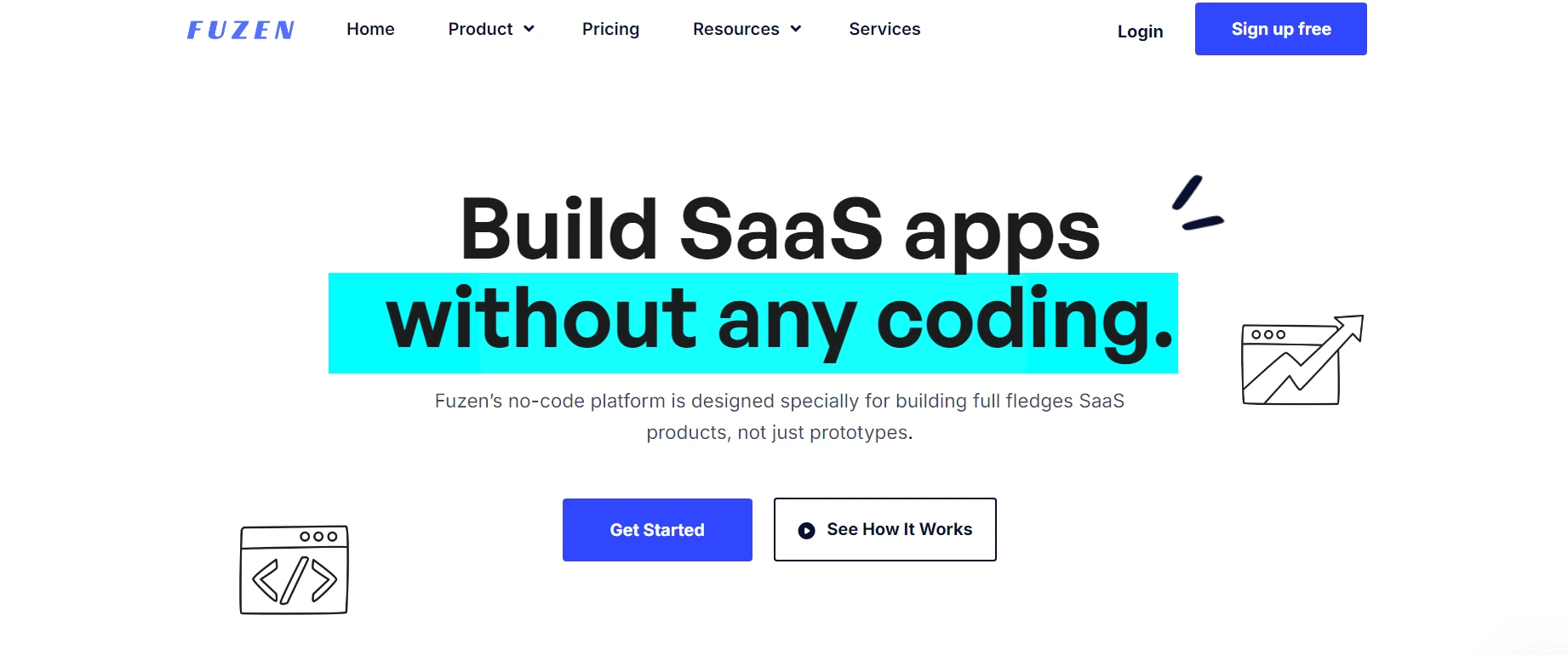
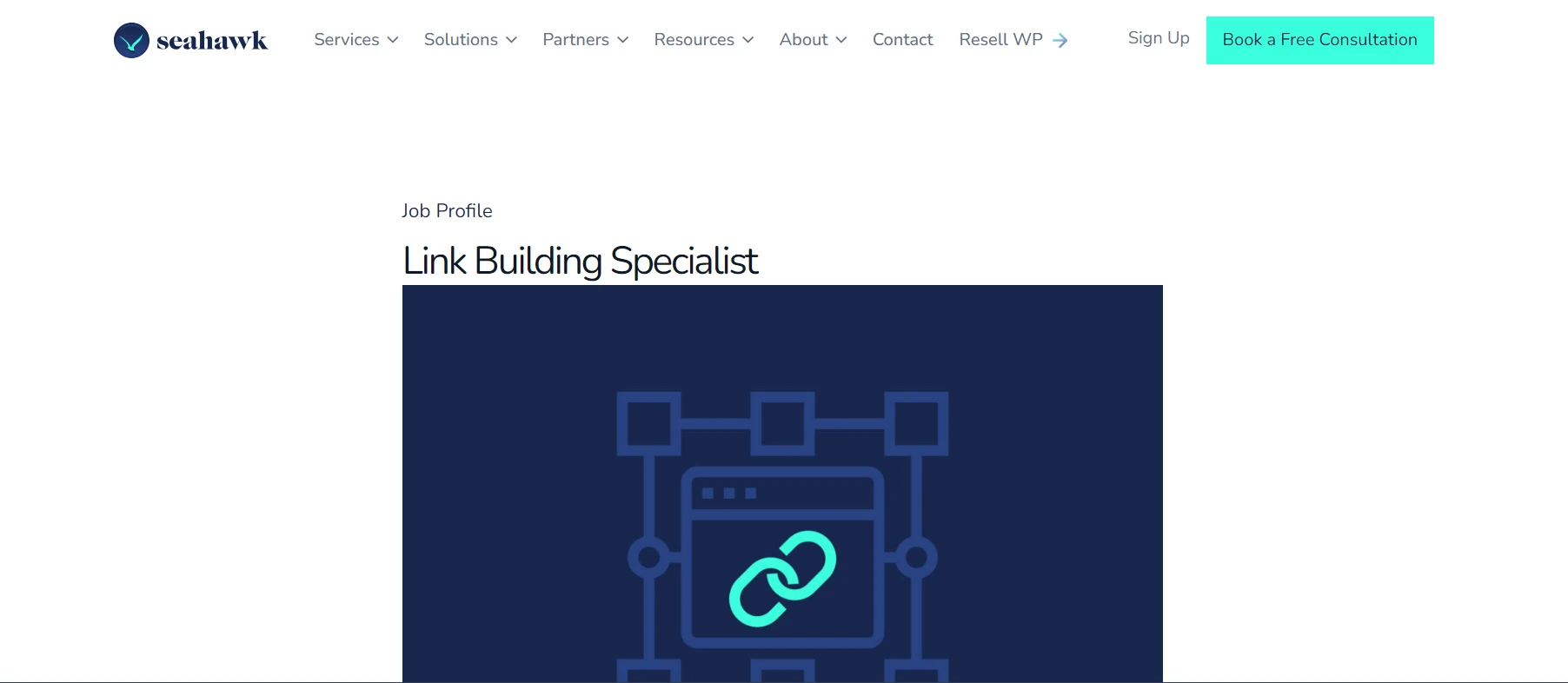
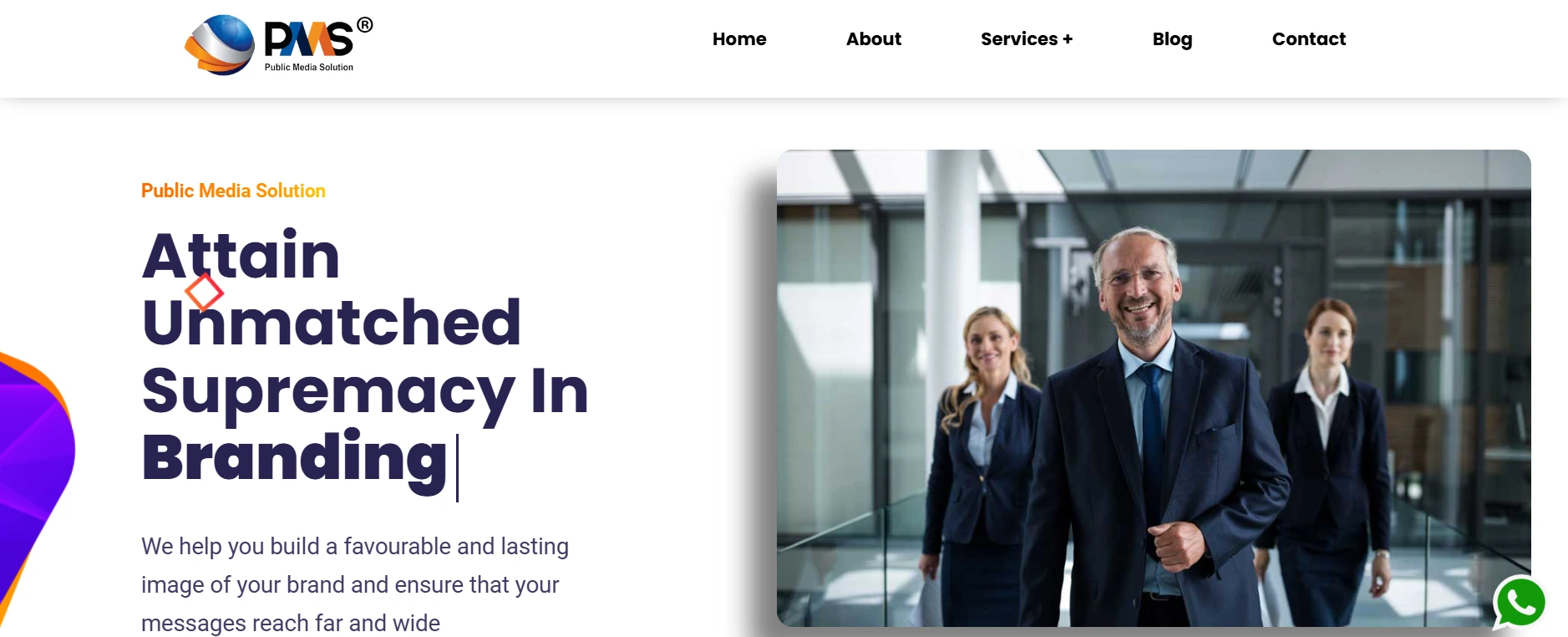
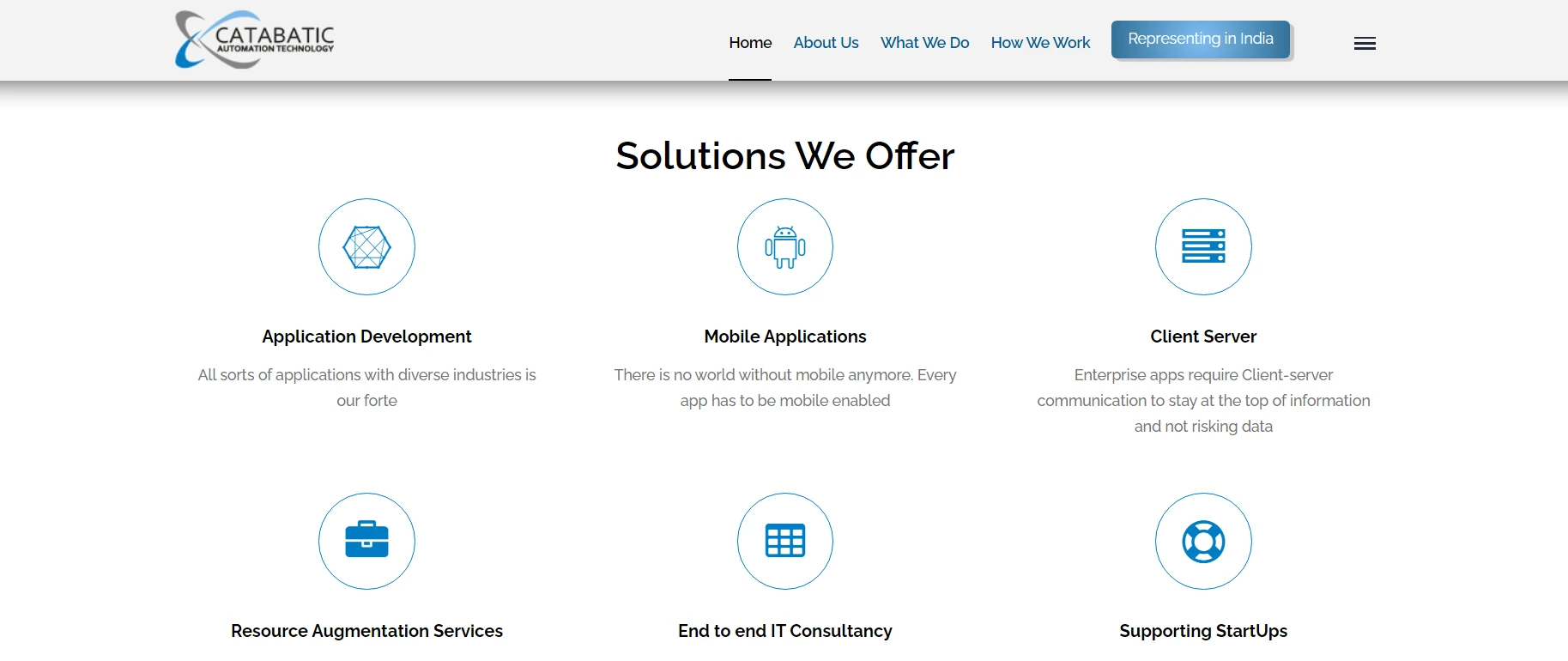
Key Responsibilities:
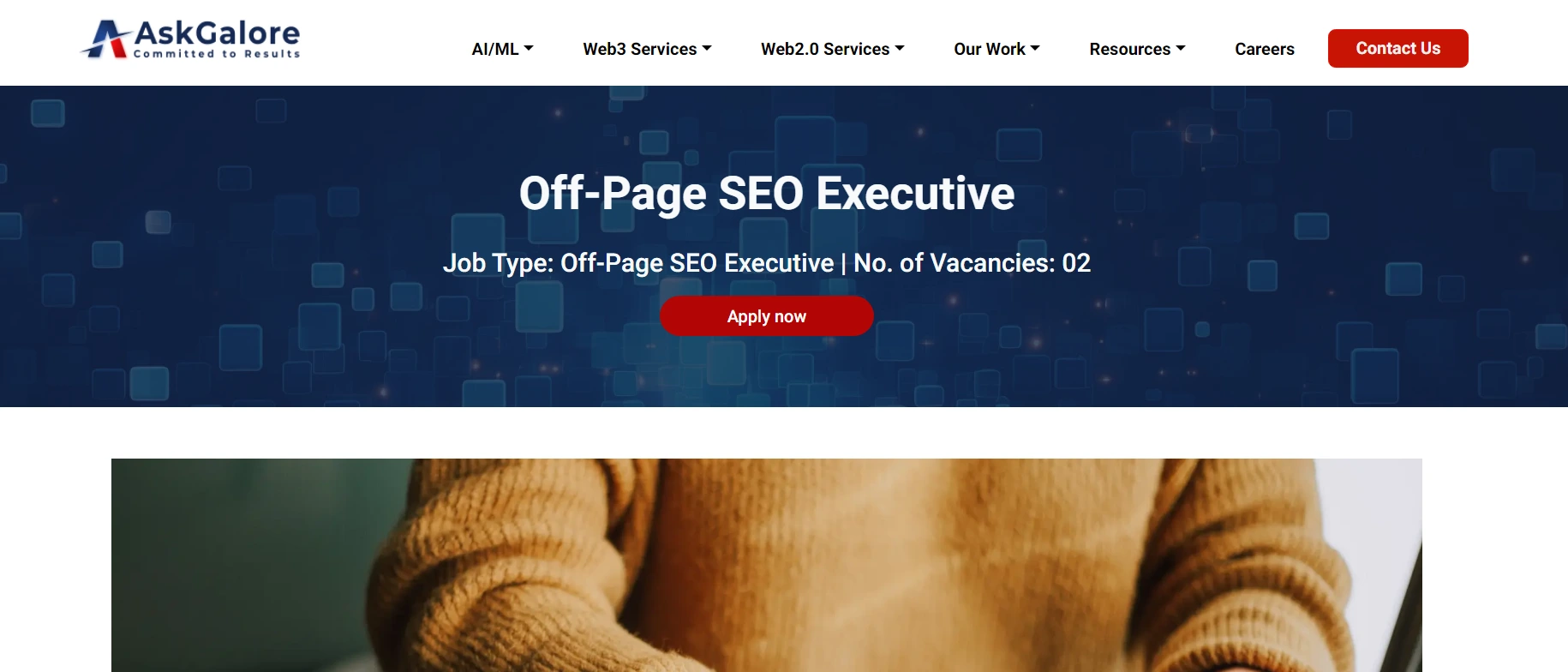
Role of a Link Building Specialist
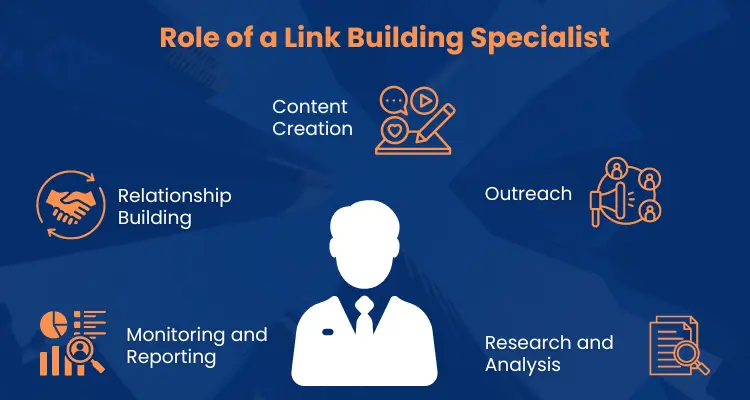
A link building specialist is responsible for developing and executing strategies to acquire these valuable backlinks. Their role is multifaceted, involving several key activities:
- Research and Analysis: Identifying potential link opportunities through competitor analysis and backlink profile evaluation.
- Outreach: Contacting webmasters, bloggers, and influencers to secure link placements.
- Content Creation: Collaborating with content creators to develop link-worthy content such as articles, infographics, and videos.
- Relationship Building: Maintaining and nurturing relationships with industry influencers and partners.
- Monitoring and Reporting: Tracking the success of link building efforts and making data-driven adjustments to strategies.
A link building specialist's goal is to build a strong, diverse backlink profile that enhances the website's authority, improves its visibility in search results, and ultimately drives more organic traffic. Effective link building requires a mix of creativity, analytical skills, and persistence, as building quality links is often a long-term effort.
By leveraging these skills and strategies, link building specialists help businesses improve their online presence and achieve their digital marketing goals.
The Link Building Process
Step-by-Step Guide
1. Identifying Link Opportunities:
- Finding Relevant Websites and Communities:
- Industry Blogs and Websites: Look for blogs and websites within your industry that have high authority and relevance to your content. Use search queries like "best [industry] blogs" or "top [industry] websites."
- Online Communities and Forums: Participate in online forums and communities like Reddit, Quora, or industry-specific forums where you can share your content and build relationships.
- Competitor Analysis: Study your competitors' backlink profiles to identify websites that link to them and could potentially link to you as well. Tools like Ahrefs and SEMrush are useful for this.
- Using Tools for Prospecting:
- Ahrefs: Use Ahrefs to find backlink opportunities by exploring your competitors' backlink profiles and identifying high-authority sites that might link to your content.
- Moz Link Explorer: Another excellent tool for discovering potential link opportunities and analyzing the domain authority of prospective sites.
- BuzzSumo: Identify popular content in your niche and see who is linking to it, then reach out to those sites with your own high-quality content.
2. Content Creation
- Developing High-Quality Shareable Content:
- In-Depth Guides and Tutorials: Create comprehensive guides that cover a topic in detail. These tend to attract more links because of their depth and usefulness.
- Infographics: Visual content like infographics are highly shareable and often attract backlinks from websites looking to provide valuable resources to their audience.
- Original Research and Case Studies: Publishing unique research or case studies can draw attention and links from other sites looking to reference credible data.
- Examples of Content Types that Attract Links:
- Listicles: Articles that list top tools, tips, or resources.
- How-To Guides: Step-by-step instructions on how to accomplish something specific in your industry.
- Interviews with Experts: Content that includes insights from industry leaders or influencers.
3. Outreach and Relationship Building
- Personalized Email Outreach Techniques:
- Research Your Targets: Understand the recipient's website and audience before reaching out. Personalize your email to show that you've done your homework.
- Offer Value: Explain how linking to your content will provide value to their audience. Highlight any mutual benefits.
- Keep It Short and Sweet: Be concise and get to the point quickly. Busy webmasters and bloggers appreciate brevity.
- Leveraging Social Media and Networking:
- Engage with Influencers: Follow and interact with industry influencers on social media platforms like Twitter and LinkedIn. Share their content and provide thoughtful comments to build rapport.
- Join Industry Groups: Participate in LinkedIn groups or Facebook groups related to your niche. Share your content where appropriate and build relationships within these communities.
- Tracking Link-Building Performance:
- Google Analytics: Monitor referral traffic to see which backlinks are driving visitors to your site.
- Ahrefs and Moz: Track the number of backlinks, referring domains, and the quality of those links. These tools also help in identifying any lost or broken links that need attention.
- Tools for Monitoring and Reporting:
- Google Search Console: Provides insights into your site's search performance and identifies any issues with your backlinks.
- SEMrush: Offers comprehensive tracking and reporting features for backlinks, including competitor analysis and link-building progress.
- Staying Updated with SEO Trends:
- Follow Industry Blogs: Keep up with the latest SEO news by following blogs like Moz, Search Engine Journal, and Ahrefs.
- Attend Webinars and Conferences: Participate in SEO webinars and conferences to learn about the latest trends and network with other professionals.
- Adapting Strategies Based on Analysis:
- Regular Review: Continuously analyze the performance of your link-building campaigns. Identify what's working and what isn't, and adjust your strategies accordingly.
- Experiment with New Approaches: Don't be afraid to try new link-building tactics and measure their effectiveness. The SEO landscape is always changing, and staying flexible is key to long-term success.
- Competitor Analysis: Study competitors' backlink profiles to find where their links are coming from and target those sites.
- Content Research: Identify popular content in your niche and see who is linking to it, then create similar or better content to attract those links.
- Resource Pages: Look for resource pages in your industry that list useful links and aim to get your content included there.
- Anchor Text Optimization: Ensuring anchor texts are relevant and diverse to avoid penalties.
- No-follow vs. Do-follow Links: Understanding the difference and their impact on SEO.
- Prioritize Tasks: Focus on high-impact tasks first.
- Use Productivity Tools: Tools like Trello, Asana, or a simple spreadsheet can help track tasks and deadlines.
- Set Realistic Goals: Break down large tasks into smaller, manageable steps to maintain steady progress.
- Create a Daily Schedule: Allocate specific times for different tasks to stay on track.
- Avoid Multitasking: Focus on one task at a time to improve efficiency and quality of work.
- Regular Reviews: Periodically review your progress and adjust your plans as needed.
- Identify Relevant Blogs: Use search queries like "your industry + write for us" or "your niche + guest post" to find blogs that accept guest posts.
- Leverage Social Media: Platforms like Twitter and LinkedIn can help you discover guest blogging opportunities through industry discussions and influencer posts.
- Utilize Outreach Tools: Tools like BuzzSumo or Ahrefs Content Explorer can help you find popular blogs and influencers in your niche who might be open to guest posts.
- Use Tools: Tools like Ahrefs, Screaming Frog, and Check My Links can help you find broken links on target websites.
- Analyze Competitors: Check the backlink profiles of your competitors for broken links using tools like Ahrefs or Moz.
- Guides and Tutorials
- Infographics
- Original Research and Case Studies
- Listicles
- How-To Guides
- Interviews with Experts
- Number of Backlinks:
- This is the total count of backlinks pointing to your website. While quantity is not the only metric, it provides a basic measure of your link-building efforts
- Source:Ahrefs, Moz
- Domain Authority (DA) and Page Authority (PA):
- These metrics, developed by Moz, indicate the overall strength and credibility of your website and individual pages. Higher authority scores typically correlate with better ranking potential.
- Source:Moz
- Referral Traffic:
- Tracks the number of visitors coming to your site through backlinks. This helps measure the direct traffic impact of your link-building campaigns.
- Source:Google Analytics
- Keyword Rankings:
- Monitoring changes in your rankings for targeted keywords helps assess the impact of link-building on your search visibility.
- Source:SEMrush, Ahrefs
- Link Quality:
- Evaluates the quality of your backlinks based on factors such as the authority and relevance of the linking domain, the placement of the link, and the context in which it appears.
- Source:Ahrefs,Majestic
- Number of Referring Domains:
- Indicates the number of unique domains linking to your website. A diverse link profile with links from various domains is more beneficial than many links from a single domain.
- Source:Ahrefs,Moz
- Anchor Text Distribution:
- Analyzing the anchor text used in your backlinks helps ensure a natural and varied link profile, avoiding over-optimization penalties.
- Source:Ahrefs, SEMrush
- Conversion Rate:
- Measures the effectiveness of your link-building efforts in driving conversions, such as sign-ups, purchases, or inquiries.
- Source: Google Analytics
What is a link building job description?
What does link building do?
What is link building in PR?
What is link building earning?
What is a link building manager?
What is link position?
What are the benefits of link building?
- Improved Search Engine Rankings: High-quality backlinks can help a website rank higher in search engine results.
- Increased Organic Traffic: Better rankings can lead to more organic traffic from search engines.
- Enhanced Domain Authority: Backlinks from reputable sites can boost your domain authority.
- Broader Online Visibility: Links from popular websites can increase your exposure to new audiences.
- Brand Credibility: Being linked to by authoritative sites can enhance your brand's credibility and reputation.
Is link building expensive?
What is the work of a link?
What is link building vs link earning?
4. Monitoring and Analysis
5. Continual Improvement
Key Skills of a Link Building Specialist
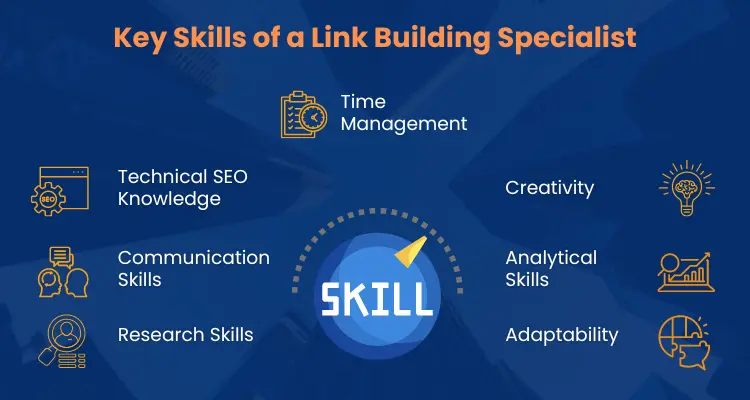
1. Analytical Skills
Importance of Data Analysis in Link Building: Data analysis is crucial in link building as it helps identify which strategies are working and which need adjustment. By analyzing data, link building specialists can track the performance of their links, understand their impact on search rankings, and make informed decisions to improve future campaigns.
2. Communication Skills
Role of Communication in Outreach and Negotiations: Effective communication is key in link building as it involves reaching out to webmasters, bloggers, and influencers. Good communication skills help in persuading these parties to link to your content, negotiate terms, and build long-term relationships.
3. Research Skills
Methods for Identifying Link Opportunities:
4. Technical SEO Knowledge
Basic Technical SEO Concepts Relevant to Link Building:
5. Time Management
a. Strategies for Managing Multiple Link Building Campaigns:
b. Tips for Prioritizing Tasks and Staying Organized:
6. Creativity and Adaptability
Role of Creativity in Crafting Outreach Emails and Link-Worthy Content: Creativity helps in crafting compelling outreach emails that stand out and creating unique, valuable content that naturally attracts links. This can involve using storytelling, humor, or unique data to capture attention.
Adapting to Changing SEO Trends and Algorithm Updates: SEO is constantly evolving, so it's crucial to stay updated on the latest trends and algorithm changes. This requires continuous learning and the ability to pivot strategies quickly in response to new information or changes in the digital landscape.
Effective Link Building Strategies
1. Guest Blogging
Finding and Securing Guest Blogging Opportunities: Guest blogging is a powerful link building strategy where you write articles for other blogs in your industry. To find guest blogging opportunities:
2. Broken Link Building
Identifying Broken Links on High-Authority Websites: Broken link building involves finding broken links on authoritative websites and offering your content as a replacement. To identify broken links:
3. Resource Link Building
Creating Valuable Resources That Others Will Want to Link To: Resource link building involves creating comprehensive, high-quality resources that other websites find valuable and link to. Examples include:
Measuring Link Building Success
Key Performance Indicators (KPIs) for Tracking Link Building Effectiveness
By regularly monitoring these KPIs and using these tools, you can effectively measure the success of your link-building campaigns, identify areas for improvement, and adapt your strategies to maximize their impact.
Conclusion
Link building is a vital component of SEO, playing a significant role in enhancing a website's authority and search engine rankings. A link building specialist must possess a blend of analytical skills, effective communication, thorough research capabilities, technical SEO knowledge, excellent time management, and the ability to adapt and be creative.For businesses looking to scale their SEO efforts, outsourcing link building can be an efficient way to leverage external expertise and resources.
Effective link building is more than just acquiring links; it's about building lasting relationships and creating valuable content that others naturally want to link to. By focusing on quality over quantity and continuously improving your tactics, you can build a strong backlink profile that enhances your website's credibility and visibility in search engines.
FAQs
A link building job description typically includes responsibilities such as developing and executing strategies to acquire backlinks, identifying link opportunities through research and analysis, conducting outreach to potential link partners, creating and promoting content to attract links, monitoring and reporting on link-building performance, and staying updated with SEO trends.
Link building is the process of acquiring hyperlinks from other websites to your own. These links help search engines understand that your website is a valuable and credible resource, which can improve your search engine rankings.
Link building in PR (Public Relations) involves using traditional PR strategies to acquire backlinks. This can include pitching stories to journalists and bloggers, issuing press releases, and leveraging media coverage to generate high-quality backlinks from reputable news outlets and industry sites.
Link building earning refers to acquiring backlinks organically through the merit of your content, rather than through paid or manipulative methods. This approach focuses on creating high-quality, valuable content that naturally attracts links from other websites because it is useful, informative, or entertaining.
A link building manager oversees the link-building strategies and campaigns within an organization. Their responsibilities include planning and implementing link-building tactics, managing a team of link builders, analyzing link-building performance, and ensuring that all activities comply with search engine guidelines.
Link position refers to the location of a hyperlink on a webpage. The placement of a link can impact its effectiveness. Search engines may assign more weight to links that appear in prominent positions on a webpage.
The benefits of link building include:
The cost of link building can vary widely depending on the methods used. Organic link building through content creation and outreach is generally more time-consuming but can be cost-effective. However, paid link building or specialized link building agency hiring a can be more expensive. It's important to focus on quality over quantity to ensure a good return on investment.
The work of a link (hyperlink) is to connect one webpage to another. Links are used to navigate between pages on the internet, providing pathways for users and search engines.
Link building refers to the process of actively seeking and acquiring backlinks through various strategies such as outreach and guest blogging. Link earning, on the other hand, happens naturally when other websites link to your content because it is valuable, high-quality, and relevant.



